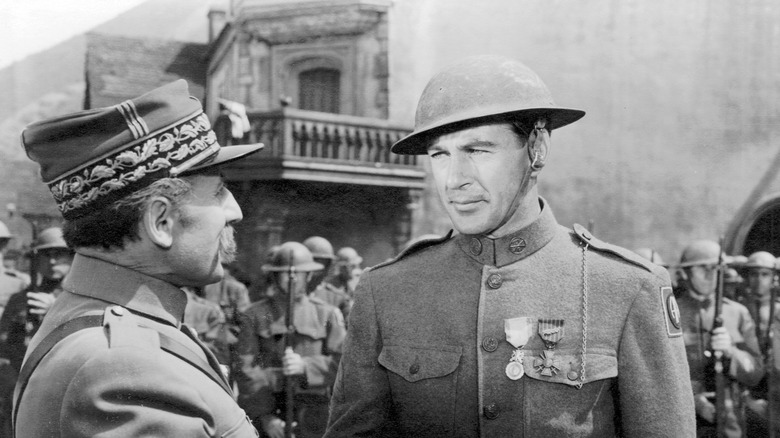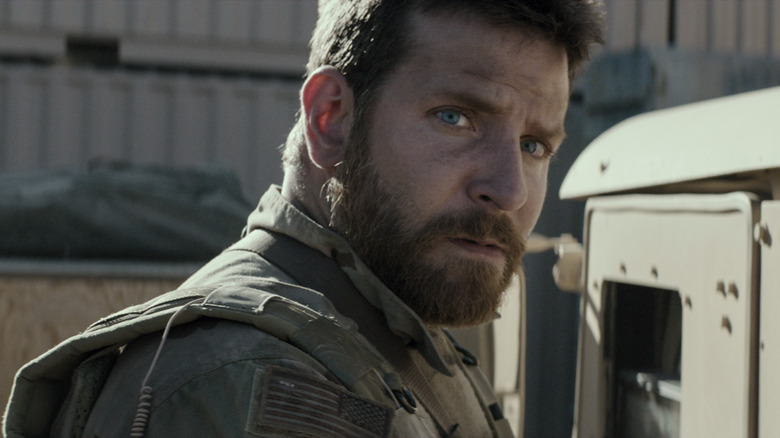The Movie That Inspired Clint Eastwood To Be An Actor
Clint Eastwood has had a prolific career both in front and behind the camera, with over 70 film and television credits and over 40 directing credits. His love of cinema began when he made frequent trips to the movie theatre as young as five years old (per Roger Ebert). Eastwood first realized that he wanted to be a part of making movie magic when he was 11 years old and saw the 1941 Howard Hawks film "Sergeant York" with his father who loved war films.
"Sergeant York" was the most popular movie of 1941, "a phenomenon of staggering proportions" (via NY Books). It stars the famed western hero Gary Cooper as Alvin York, a humble Tennessee farmer and marksman who is drafted in World War I despite being a pacifist. His expert shooting skills made him one of the most celebrated war heroes. Cooper was praised for his marvelous performance — a performance that inspired Eastwood to become an actor. As Eastwood said:
"I remember once while I was doing (the TV series) `Rawhide' long ago, I went next door and met Gary Cooper, and I thought, God! I remember growing up and my dad taking me to 'Sergeant York' and all those great pictures. And then all of a sudden, one day you wake up, and younger actors are looking up to you, and all I can remember is being 5 years old and going to films."
Not only did Eastwood want to emulate the actors he saw in films, but he also wanted to be a director and have control over the stories that were being told. "I like being involved with a story from beginning to end. You're not just a singular element of a movie, you're painting the picture and holding the brush," Eastwood reflected on his role as a director (via The Wrap).
Decades after seeing "Sergeant York" with his father, Clint Eastwood directed "American Sniper," a "'Sergeant York' for a new generation." Gary Cooper's portrayal of the courageous sharpshooter surely influenced his depiction of Chris Kyle, the deadliest sniper in American military history. Both films raise some interesting questions about the representation of American patriotism and masculinity.
The influence of Sergeant York in American Sniper
Opening five months before Pearl Harbor, "Sergeant York" was a propaganda film made to encourage isolationist America to enter World War II. "The message of this film is that you can be anti-war in general but still rise to the duty of serving the nation in war," Solzy at the Movies writes. As a story of a good guy triumphing over evil, "Sergeant York" romanticizes the violence of war and American nationalism. Many of these themes are seen in "American Sniper."
Much like Sergeant Alvin York, Chris Kyle was a Bible-thumping country boy and expert shooter. He became known as "The Legend" for killing over 200 people. "American Sniper" was immensely popular upon release, earning six Academy Award nominations and surpassing Steven Spielberg's "Saving Private Ryan" as the top-grossing war film (via The Guardian). Eastwood's film was also accused of being right-wing propaganda, evident in conservative viewers' rabid adoration for the film. Chris Hedges had one of the most scathing reviews for TruthDig:
"'American Sniper' lionizes the most despicable aspects of U.S. society—the gun culture, the blind adoration of the military, the belief that we have an innate right as a 'Christian' nation to exterminate the "lesser breeds" of the earth, a grotesque hypermasculinity that banishes compassion and pity, a denial of inconvenient facts and historical truth, and a belittling of critical thinking and artistic expression."
Many felt that Eastwood was aggrandizing an Islamophobic male chauvinist who once called the Iraq people "despicably evil," stating in his autobiography "American Sniper: The Autobiography of the Most Lethal Sniper in U.S. Military History" that he found "killing savages fun" and regretted not killing more. Eastwood attempts to make the unremorseful Chris Kyle into a more well-rounded, sensitive, and morally ambiguous character — especially during the harrowing opening scene where he has doubts about killing a woman and child, as well as his homecoming struggles with Post-Traumatic Stress Disorder.
Sergeant York was more of a straightforward hero in the classic Hollywood tradition, and the good vs. evil formula doesn't work for "American Sniper" with such a controversial real-life protagonist and the contested Iraq War.

